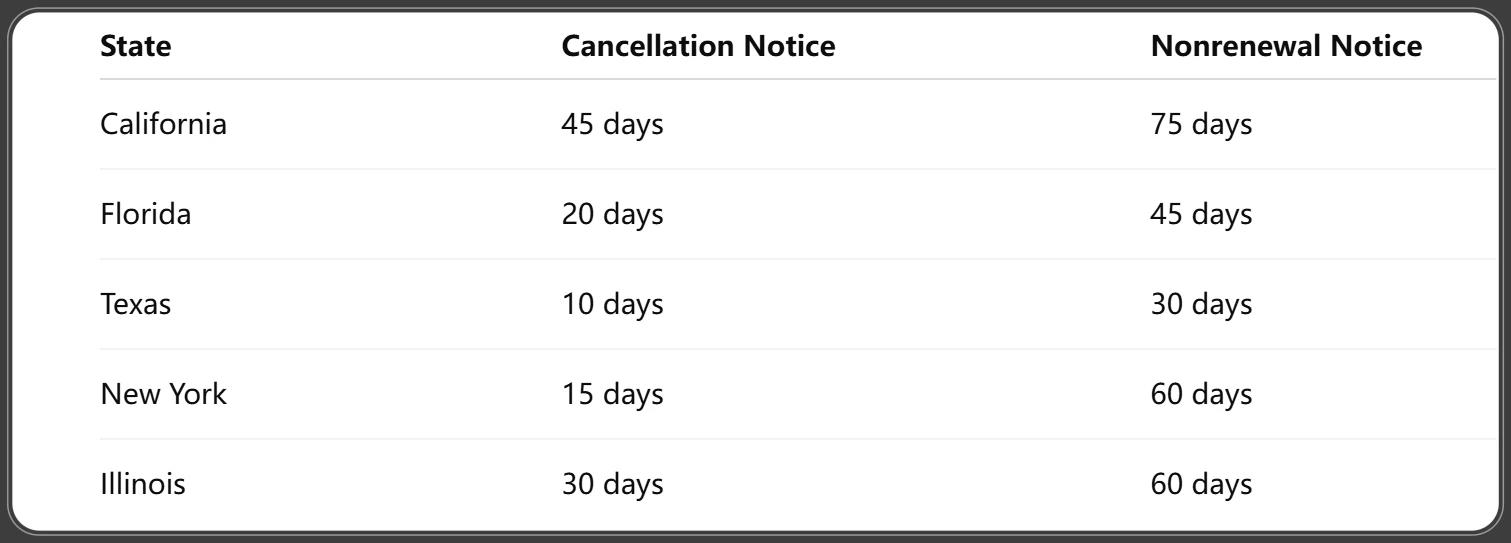Home Insurance Cancellation Rights 2025: Know Your Legal Protections & Next Steps
Published on August 1, 2025

Sarah Patel
Homeowners & Property Insurance Expert.
Sarah Patel is a property underwriter-turned-writer with 10 years in the field; she focuses on flood, wildfire, and replacement-cost planning for homeowners.
Home Insurance Cancellation Rights 2025: What Every Homeowner Needs to Know
Receiving a cancellation notice from your home insurance provider can feel like a punch to the gut—especially in 2025, when weather events, rising premiums, and stricter underwriting are leading to more dropped policies than ever before.
But here’s the truth: home insurance cancellation rights 2025 exist to protect you. You have legal options, appeal rights, and, in many cases, access to alternative coverage.
Let’s explore your rights, what to do if you get canceled, and how to stay insured—even in the most challenging market conditions.
Why Home Insurance Policies Are Being Cancelled More Frequently in 2025
Insurers are pulling back from risk-heavy regions, raising deductibles, and dropping customers at historic rates. Here's why:
- Increased weather-related claims (wildfires, floods, hurricanes)
- Shrinking profit margins due to global inflation
- Reinsurance costs making some policies financially unsustainable
- AI-based risk analysis tools flagging high-risk properties
These industry shifts have made policy cancellations and nonrenewals far more common—even among long-time policyholders.
Types of Policy Cancellation
Understanding how your policy was canceled helps you respond effectively.
1. Nonrenewal
- Happens at the end of your policy term
- Common if you've made multiple claims, or if your area is deemed high risk
2. Mid-Term Cancellation
- Happens during your active policy period
- Usually allowed only for serious reasons (fraud, non-payment, major risk changes)
3. Lapse Due to Non-Payment
- Your policy ends because of missed premium payments
- Often avoidable with auto-pay or timely contact
Your Legal Rights If Your Home Insurance Is Cancelled
States regulate cancellation practices to prevent abuse and unfair treatment.
Key Protections Include:
- Minimum notice periods
- Written explanation of cancellation reasons
- Right to appeal or dispute cancellations
- Protection from discriminatory practices
In 2025, many states have expanded homeowner rights due to the growing risk of “insurance deserts.”
Required Notice Periods for Cancellation by State (2025 Update)

⚠️ Always check with your state’s Department of Insurance—rules can vary and change annually.
What to Do Immediately After Receiving a Cancellation Notice
- Don’t panic—you usually have time before the policy ends.
- Review the notice and highlight the exact reason.
- Contact your insurer and request more details or a review.
- Request reinstatement if cancellation was due to something correctable.
- Start shopping for new coverage—immediately.
How to Dispute a Home Insurance Cancellation in 2025
If you believe your cancellation was unfair or incorrect, follow these steps:
- File an internal appeal with your insurer.
- Submit photos, receipts, or inspection reports as evidence.
- Contact your state insurance regulator to escalate.
- If needed, involve a licensed insurance attorney or consumer advocate.
Many states offer free arbitration services or consumer complaint platforms for faster resolution.
Common Reasons for Policy Cancellations in 2025
Insurers look at multiple risk factors:
- Too many claims in a short period
- Poor home maintenance (peeling paint, outdated wiring)
- Incomplete roof repairs or expired permits
- Living in wildfire, hurricane, or flood-prone areas
- Undisclosed property upgrades or occupancy changes
Even installing risky additions like trampolines or pools without notice can trigger a policy drop.
How to Avoid Getting Your Home Insurance Cancelled
While some factors (like your ZIP code) are out of your control, many risks can be minimized.
Tips:
- Maintain your home proactively
- Install smart home sensors for fire and water leaks
- Schedule a voluntary inspection with your insurer
- Avoid making small claims; pay out-of-pocket when possible
- Communicate life changes (renting rooms, renovations, etc.) early
Finding a New Policy After Cancellation
If your coverage is canceled, don’t wait—start the replacement process immediately.
Options:
- Work with independent brokers who specialize in high-risk clients
- Look into FAIR Plans (state-run insurance for uninsurable homes)
- Consider surplus lines insurers who cover high-risk properties
- Explore digital-first insurers that use flexible AI risk modeling
Expect higher premiums temporarily, but you'll maintain protection while rebuilding your risk profile.
Do You Still Have Coverage After a Cancellation Notice?
Yes—but only until the effective cancellation date listed in your notice. During this period, your policy remains active, meaning:
- You're still protected against covered perils.
- You can still file claims.
- You have time to secure a replacement policy.
Important:
Once the effective date passes, your coverage ends immediately, and any incidents occurring afterward won’t be covered—even if they happen hours after your policy expires.
Can an Insurance Company Cancel After a Natural Disaster Claim?
This is one of the most pressing concerns in 2025, especially after wildfires, floods, or hurricanes.
Current Laws (2025):
- Some states, like California and Florida, prohibit nonrenewals or cancellations for 12 months after a declared disaster.
- These laws are intended to protect vulnerable homeowners from being punished for unavoidable claims.
- However, these protections usually apply only to disaster-related claims, not if you have unrelated issues (e.g., maintenance problems).
Always check your state’s emergency insurance orders following major events.
Home Insurance Cancellation and Mortgage Implications
Your lender requires you to maintain homeowners insurance as part of your mortgage contract. If your policy lapses:
Here's What Can Happen:
- Your lender may purchase force-placed insurance on your behalf.
- This coverage is often 2–3 times more expensive and offers less protection.
- Your monthly mortgage payment will increase to cover it.
Prevent It:
- Notify your lender immediately after a cancellation notice.
- Provide proof of a new policy or pending application.
How to Prevent Future Policy Cancellations
Being proactive is your best defense.
Key Steps:
- Review your policy annually—especially after updates or renovations.
- Limit claims—if possible, pay out-of-pocket for small losses.
- Install risk-mitigating upgrades: storm shutters, roof reinforcement, water shutoff valves.
- Use smart home monitoring systems to prevent fire, flood, and theft losses.
- Consider increasing your deductible to discourage frequent small claims.
By showing insurers that you’re a responsible, low-risk homeowner, you increase your chance of staying insured.
State and Federal Protections for High-Risk Homeowners in 2025
With rising climate risk, many homeowners are labeled “uninsurable.” But you still have options.
State-Level Programs:
- FAIR Plans (e.g., California FAIR, Texas FAIR)
- Citizens Property Insurance Corporation (Florida)
These programs offer basic coverage for homeowners who can't find private insurance.
Federal Support:
- FEMA-backed flood insurance (NFIP)
- Legislative pushes in 2025 for a Federal Catastrophic Insurance Pool (under debate)
Stay informed via your state Department of Insurance and consider reaching out to a consumer advocacy group for help.
Frequently Asked Questions About Home Insurance Cancellation Rights
1. Can my insurer cancel my policy without warning?
No. State laws require written notice and a specific number of days (e.g., 30–60) depending on the cancellation reason.
2. Can I get insurance again after cancellation?
Yes. Many insurers specialize in nonstandard or high-risk coverage, though your premiums may be higher at first.
3. Can I appeal my cancellation?
Absolutely. You can appeal directly to your insurer and escalate to your state’s insurance regulator if needed.
4. Does cancellation affect my credit score?
No. Insurance cancellations don’t directly impact your credit, but they may influence future insurance rates and eligibility.
5. Can I switch insurers after a cancellation notice?
Yes, and you should start shopping immediately to avoid a coverage gap.
6. Is a cancellation the same as a nonrenewal?
No. Cancellations happen mid-term, often for specific violations. Nonrenewals occur at the end of the policy term, typically due to risk reassessment.
Conclusion: Stand Your Ground and Stay Protected in 2025
Being dropped by your insurer can feel like you’re losing a safety net—but remember, you have rights and options.
Quick Recap:
- Understand your notice and respond quickly.
- Challenge cancellations you believe are unfair.
- Find alternative coverage before the policy ends.
- Avoid future cancellations through proactive home maintenance and risk reduction.
In 2025’s unpredictable insurance landscape, knowledge is power. With the right steps, you can stay covered, protect your home, and maintain peace of mind—no matter what challenges come your way.
You Might Also Like
Home Insurance Replacement Cost 2025: The Ultimate Guide to Full Home Protection
Aug 1, 2025Home Insurance for Rental Property 2025: 15 Key Updates Landlords Must Know
Aug 1, 2025Home Insurance Inflation Guard 2025: Why You Absolutely Need It Now
Aug 1, 20259 Critical Steps for Getting Home Insurance After a Claim in 2025
Aug 1, 2025Top 17 Must-Know Facts About Home Insurance for Condos 2025
Aug 1, 2025
